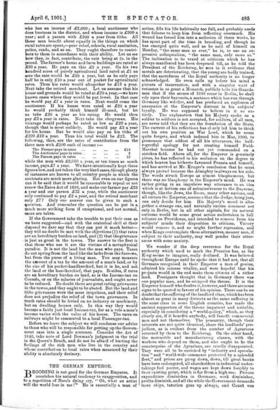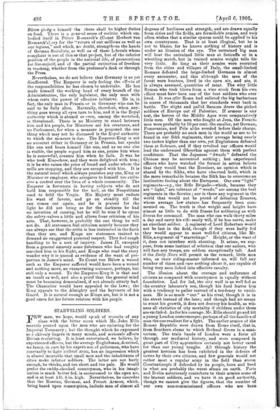THE GERMAN EMPEROR. B ROODING is not good for the German
Emperor. It nourishes his natural tendency to exaggeration, and to a repetition of Nero's dying cry, "Oh, what an artist will the world lose in me !" He is essentially a man of action, fills his life habitually too full, and probably needs that fulness to keep him from reflecting overmuch. His wound has forced him into a seclusion of three weeks, he has spent part of the time in brooding, and though he has emerged quite well, and as he said of himself on Monday, "the same man as ever," he is, to use an ex- pressive colloquialism, "the same man, only more so." The inclination to be vexed at criticism which he has always manifested has been deepened till, as he told the President of the Reichstag, he sees in it evidence that morals are deteriorating, that the young are badly trained, that the sacredness of the Royal authority is no longer acknowledged. He even calls up before his mind a picture of insurrection, and with a singular want of reticence in so great a Monarch. publicly tells his Guards- men that if the scenes of 1848 recur in Berlin, he shall rely upon their bayonets, a sentence which has run through Germany like wildfire, and has produced an explosion of annoyance at the Emperor's distrust in his subjects' loyalty. He was supposed to believe in it so en- tirely. The explanation that his Majesty spoke as a soldier to soldiers is not accepted, for soldiers, of all men, are never told that they are the foundation of the State. The current of his reflections has clearly led him to think out his own position as War Lord, which he nevet quite forgets, and which induced him in May, 1900, to pronounce that oddest of all his utterances, the half- regretful apology for not creating himself Field- Marshal because he had not yet commanded on a stricken field. Above all, for the Emperor is genuinely pious, he has reflected in his seclusion on the degree to which heaven has hitherto favoured Prussia and himself, and has arrived at Mr. Kruger's conclusion that he must always prevail because the Almighty is always on his side. The words struck Europe as almost blasphemous, but there was no blasphemy in the Emperor's mind. He was rather giving in an impulsive way utterance to an idea which is at bottom one of submissiveness to the Supreme, though, like the Jews, the Boers, many other nations, and all suitors the Emperor, assumes that the Judge, being just, can only decide for him. His Majesty's mood is alto- gether a strange one, and naturally excites comment not only in Berlin, but in all other capitals, for its natural outcome would be some great action undertaken in full reliance on Providence, and intended to remove from his subjects' minds their disposition to criticise. Victory would remove it. and so might further repression, and when Kings contemplate those alternatives, meaner men, if subject to their authority, may well ponder their utter- ances with some anxiety.
We wonder if the deep reverence for the Royal authority which used to mark the Prussian has, as the King seems to imagine, really declined. It was believed throughout Europe until he spoke that it had not, that all Germans recognised in their Emperor a man of genius, admired his intense vitality, and were hopeful that his projects would in the end make them citizens of a richer land. Foreigners thought that in Germany there was one popular man, and he occupied the throne. It is the Emperor himself who doubts it, however, and there are some signs to be quoted in favour of his opinion. There can be no doubt that thesuffering of the landlord class, which has been almost as great in many districts as the same suffering in the same class in some English counties, has made the ancient supporters of the throne impatient and irritable, especially in considering a "world-policy," which, as they clearly see, if it benefits anybody, will benefit commercial men and not themselves. The peasantry, though their interests are not quite identical, share the landlords' pre- judices, as is evident from the number of Agrarians returned by them to the Reichstag. On the other hand, the mercantile and manufacturing classes, with the workers who depend on them, and who ought to be the counterpoise of the Agrarians, are cruelly disappointed. They were all to be enriched by "industry and specula- tion "and "world-wide commerce protected by a splendid fleet," and prices are going down, down, till great banks have been endangered, all shareholders in industrial under- takings feel poorer, and wages are kept down forcibly to their existing point, which is far from a high one. Private expenditure diminishes in Germany, work diminishes, profits diminish, and all the while the Government demands more ships, taxation goes up always, and Count von Billow pledg ea himself tha- there shall be higher duties on food. There is a general sense of malaise. which em- bodied itself in Prince Biemarck's (Count Herbert von Bismarck's) cry for the "return of our millions as well as our legions," and which, no doubt, strengthens the hands of German Socialists, as well as of those Liberals whose complaint is not of this or that project, but of the inferior position of the people in the national life, of prosecutions for le,se-majeste, and of the partial extinction of freedom in teaching, whether from the professor's desk or through the Press.
Nevertheless, we do not believe that Germany is as yet disaffected. The Emperor is only feeling the effects of the responsibilities he has chosen to undertake. He has made himself the working head of every brandi of the Administration, the only legislator, the only man with whom rests the power of effective initiative. He is, in fact, the only man in Prussia or in Germany who can be said to be fully alive. Naturally, therefore, when any- thing goes wrong all eyes turn to him, and it is the Royal authority which is abused or even, among the wretched, is threatened. There is no Ministry to stand between him and his people, for Ministers are his creatures, and no Parliament, for when a measure is proposed the one thing which may not be discussed is the Royal authority to which the measure is due. The Emperor-King is not an autocrat either in Germany or in Prussia, but speaks like one and bears himself like one, and as no-one else is visible, the people regard him as one, praise him when he is successful, eensure him when he fails. It was he who took Kiao-chow, and they were delighted with him ; it is he who raises the price of bread and under whom the mills are stopping, and they are enraged with him. It is the natural recoil which always punishes any one, King or Minister or employer, who arrogates to himself too exclu- sive a control over the lives of a whole community. The Emperor is fortunate in having subjects who do not hold him responsible for the hail, as the Neapolitans used to hold the Virgin. His Majesty must endure his want of favour, and go on steadily till the sun comes out again, and he is praised for the light he did not bring as for the darkness he had no intention of causing, but he will be wise if he opens the safety-valves a little and allows freer criticism of his acts. That, however, is probably the one thing he will not do. All statesmen feel criticism acutely because they can always see that the critic is less instructed in the facts than they are, and Kings are statesmen trained to demand an exaggerated personal respect. They feel rough handling to be a sort of impiety. James II. excepted from a general amnesty some fishermen who had roughly searched him in his flight, and Kings who read the story wonder why it is quoted as evidence of the want of pro- portion in James's mind. To Count von Billow a wound such as the Emperor suffered would have been a wound and nothing more, an exasperating nuisance, perhaps, but stall only a wound. To the Emperor-King it is that and an insult as well, and also a proof that the general mind must be becoming demoralised, if not already utterly bad. The Chancellor would have appealed to the laws ; the King appeals to the Almighty and the bayonets of his Guard. It is natural enough as Sings are, but it is not a good omen for his future relation with his people.







































 Previous page
Previous page